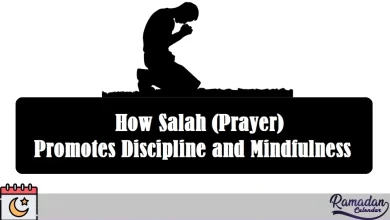The Rewards of Offering Salah: Transforming Your Life Through Prayer
The Rewards of Offering Salah: Transforming Your Life Through Prayer (Namaz)

The Rewards of Offering Salah: Transforming Your Life Through Prayer: Salah, the daily prayer that Muslims perform five times a day, is far more than a mere religious obligation. It is a deeply transformative practice that offers numerous rewards—spiritually, emotionally, and even physically. In a fast-paced world filled with distractions and challenges, Salah serves as a sanctuary, a moment to realign oneself with purpose and seek the boundless mercy of Allah. Understanding the profound rewards of Salah can inspire a deeper commitment to this sacred act and reveal how it has the power to transform your life.
Spiritual Rewards: Strengthening the Bond with Allah
The most significant reward of Salah lies in its ability to draw a person closer to Allah. When a believer performs Salah, they engage in a direct conversation with their Creator. This connection fosters a sense of peace, purpose, and spiritual fulfillment that cannot be found elsewhere. Allah says in the Quran:
“And establish prayer for My remembrance.” (Surah Taha, 20:14)
Salah reminds us of our dependence on Allah and His infinite mercy. It is during these moments of prayer that we can express our gratitude, seek forgiveness, and ask for guidance. This intimate dialogue strengthens the bond between the servant and the Creator, filling the heart with tranquility and contentment.
Emotional Rewards: Finding Peace and Resilience
One of the most noticeable effects of Salah is its ability to bring inner peace and emotional stability. Life is full of stressors, and many people struggle to find ways to cope with anxiety and uncertainty. Salah offers a powerful solution by providing moments of mindfulness and reflection. The act of standing before Allah, bowing, and prostrating allows the believer to leave their worries behind and focus on the One who controls all affairs.
The Quran beautifully encapsulates this benefit:
“Indeed, in the remembrance of Allah do hearts find rest.” (Surah Ar-Ra‘d, 13:28)
When performed with sincerity and concentration, Salah serves as an emotional anchor. It reminds us that no matter how overwhelming our problems may seem, we are never alone. The regular practice of Salah builds resilience, helping us face life’s challenges with patience and trust in Allah’s plan.
Physical Rewards: A Gift for the Body
While Salah is primarily a spiritual act, it also brings tangible physical benefits. The movements of Salah—standing, bowing, prostrating, and sitting—involve various muscle groups, promoting flexibility, circulation, and overall well-being. These postures are akin to a gentle exercise routine, particularly when performed consistently throughout the day.
Moreover, the act of washing (wudu) before Salah ensures personal hygiene, keeping the body clean and refreshed. This routine not only enhances physical health but also instills a sense of discipline and order in daily life.
Social Rewards: Building Unity and Brotherhood
Salah, especially when performed in congregation, fosters a sense of community and equality. In the mosque, individuals from all walks of life stand shoulder to shoulder, united by their faith and devotion to Allah. This collective act of worship breaks down barriers of race, class, and status, reinforcing the Islamic principle of equality.
Praying together strengthens the bonds of brotherhood and sisterhood among Muslims, creating a supportive environment where individuals feel connected and valued. The Prophet Muhammad (peace be upon him) emphasized the importance of congregational prayer, stating:
“Prayer in congregation is twenty-seven times more rewarding than prayer performed individually.” (Sahih Bukhari)
Transforming Character Through Salah
One of the most transformative aspects of Salah is its ability to refine and elevate one’s character. Regular prayer instills discipline, humility, and self-awareness. By committing to Salah, a believer learns to prioritize their time and responsibilities, ensuring that their daily actions align with their ultimate purpose.
Salah also serves as a shield against immoral behavior. Allah says in the Quran:
“Indeed, prayer prohibits immorality and wrongdoing.” (Surah Al-Ankabut, 29:45)
The act of standing before Allah five times a day reinforces a sense of accountability, reminding the believer to act with integrity and kindness in their interactions with others. Over time, this regular practice fosters virtues such as patience, gratitude, and empathy, shaping a person into the best version of themselves.
Eternal Rewards: The Ultimate Goal
While the rewards of Salah in this life are immense, the ultimate benefits lie in the hereafter. The Prophet Muhammad (peace be upon him) described Salah as the first deed that will be judged on the Day of Resurrection:
“The first matter that the slave will be brought to account for on the Day of Judgment is the prayer. If it is sound, then the rest of his deeds will be sound. And if it is deficient, then the rest of his deeds will be deficient.” (Sunan Al-Tirmidhi)
Performing Salah consistently and sincerely opens the doors to Allah’s mercy and forgiveness, paving the way to eternal bliss in Paradise. The Quran promises great rewards for those who are steadfast in their prayers:
“Indeed, those who believe and do righteous deeds and establish prayer and give zakah will have their reward with their Lord, and there will be no fear concerning them, nor will they grieve.” (Surah Al-Baqarah, 2:277)
Practical Tips for Reaping the Rewards of Salah
To fully benefit from Salah, it is essential to approach it with sincerity and mindfulness. Here are some practical tips:
- Understand the Meaning: Learn the meanings of the verses and supplications recited during Salah to deepen your connection.
- Create a Prayer-Friendly Environment: Designate a quiet, clean space for prayer, free from distractions.
- Perform Wudu Mindfully: View the ablution as a spiritual purification, preparing you to stand before Allah.
- Focus on Khushu (Concentration): Strive to pray as though you see Allah, and remind yourself of His presence.
- Maintain Consistency: Establish a routine and prioritize Salah, even during busy or challenging times.
Conclusion
Salah is far more than an obligatory act of worship; it is a transformative journey that enriches every aspect of life. From spiritual and emotional well-being to physical health and eternal rewards, the benefits of Salah are boundless. By approaching prayer with sincerity, mindfulness, and dedication, a believer can unlock its full potential, experiencing profound personal growth and a deeper connection with Allah. In the words of the Quran:
“Successful indeed are the believers, those who humble themselves in their prayers.” (Surah Al-Mu’minun, 23:1-2)
Embrace Salah not as a ritual, but as a gift—a means to transform your life and draw closer to the One who created you.





